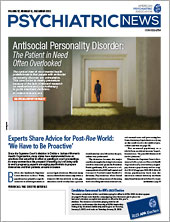Jeffrey M. Lyness, M.D., becomes president and chief executive officer of the American Board of Psychiatry and Neurology (ABPN) next month when Larry Faulkner, M.D., retires on December 31, after serving 16 years in that position.
Lyness is an ABPN director and professor emeritus of psychiatry at the University of Rochester School of Medicine and Dentistry, where he had been a professor and senior associate dean for academic affairs until October 31. He is certified by the ABPN in psychiatry and geriatric psychiatry and serves on the ABPN’s Executive Committee as board vice chair and as chair of the Psychiatry Council.
Lyness received his medical degree from the University of Rochester where he also completed his internship in internal medicine; he did his psychiatry residency at Yale University. He completed clinical and research fellowship training in the geriatrics and neuropsychiatry program at Rochester. He received the APA Vestermark Psychiatry Educator Award in 2020.
“The ABPN is an important partner for APA, and Jeffrey Lyness’ deep experience in medical and psychiatric education and longstanding service to our profession position him well in addressing the interests of APA members,” said APA President Rebecca Brendel, M.D., J.D. “I look forward to working with him in the coming year.”
APA CEO and Medical Director Saul Levin, M.D., M.P.A., added, “We congratulate Dr. Lyness on his appointment as president and chief executive officer of the ABPN and look forward to working with him on many issues of concern to APA. His past active involvement with APA gives him a working knowledge of the concerns of our members.”
Psychiatric News queried Lyness about what he anticipates during his tenure as president and CEO of the ABPN. Here are his responses.
Q. What is your vision for the ABPN in the short term and long term? What goals do you hope to accomplish in the first year or two?
A. It is an enormous honor to have the opportunity to work at the ABPN and therefore in the service of our specialty. Our collaborations with APA are very important to us, given that the two organizations have many similar areas of interest in advancing psychiatry. And as a long-time member of APA, I well appreciate the importance of APA to my own career development and to so many of our colleagues’. I served on the clinical and public health committee for DSM-5, one of two committees overseeing proposed criteria that came before the APA Board for approval; and I have also been a member of the practice guideline writing committees for schizophrenia and for borderline personality disorder. I have found my involvement with APA to be very gratifying.
Our vision for the ABPN is that our patients should have reason to feel confident in the expertise of their psychiatrist and that the ABPN should be a beacon for that expertise and excellence in psychiatric practice. Board certification by the ABPN is, and should be, widely recognized as the gold standard for the assessment of competence to provide high-quality care and for the assessment of lifelong learning to that end.
To achieve our vision, we are putting a high priority on engagement with our diplomates, candidates for certification, residency and fellowship training programs, professional organizations in our fields, and the patients and public that we all serve. Too often I hear from colleagues that the ABPN is “something of a mystery”; we will do all we can to communicate as clearly as we can what we are doing and why.
We also are redoubling our energies into diversity, equity, and inclusion within our organization and for the people and fields we serve. We are convening experts and representatives from the fields for Crucial Issues Forums related to these goals, including a focus on women this past year and a focus in 2023 on physicians from racial and ethnic groups underrepresented in medicine.
Q. How will you address ongoing dissatisfaction among some diplomates with the continuing certification process?
A. We are well aware of the burdens on us all, even more so in the past couple of years, and of the concerns expressed over time by some of our diplomates. I want to note that we have launched article-based certification programs as an option in lieu of the 10-year recertification examination. The article-based pilots in adult psychiatry and child and adolescent psychiatry were extraordinarily well received; these programs are now no longer pilots and are being implemented for all our subspecialties (
ABMS Approves Article-Based Alternative to 10-Year Exam). While we must continue to include some form of assessments in what we do—given both the science of lifelong learning and our responsibilities to the public—as part of the communication and engagement efforts noted above, I will continue to seek input from our diplomates, including through APA and other professional organizations, as to how we can do so in ways that minimize unnecessary burdens and maximize their relevance to clinical practice.
Q. Why should psychiatrists continue to seek board certification with the ABPN, recognizing that there are other options?
A. As psychiatrists, we have worked hard to gain our expertise. We should want to celebrate and recognize that expertise with continuing board certification that is rooted in the science of lifelong learning. CME is critically important, but purely self-directed CME is not sufficient to maintain clinical skills. I also note that our policies and certification programs are created, implemented, and overseen by peers, that is, by board-certified physicians in our fields. Our board remains open to feedback in service to our mission and the goals noted above. In the end, certification by ABMS member boards such as the ABPN is widely recognized by patients, health systems, and physicians because of our rigorous assessment standards.
Q. Will the ABPN continue to support APA’s Qualified Clinical Data Registry, PsychPRO? If so, why is that important?
A. The ABPN has supported APA’s PsychPRO registry because we recognize the value of being able to compare one’s own clinical practice, including patient outcomes, to those of peers. Doing so is another essential part of informed, evidence-based lifelong learning. Promoting lifelong learning is central to the ABPN’s mission and to the value of continuing certification. While specific financial support of the registry is decided by the ABPN board on an annual basis, we applaud APA for this initiative and the physicians and health systems that are electing to participate. ■

